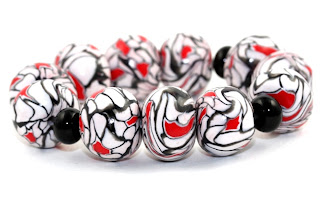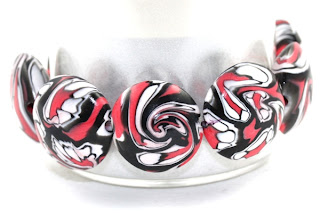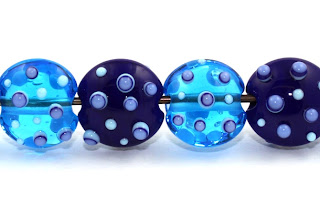
I am always striving to improve my beads and to find a new challenge! I can't help myself my brain is always working ahead of me on the next bead or next project and for a long time I have had this niggle in the back of my mind .... "why not add stamens to my floral beads?"
Whilst they look pretty and almost like trapped flowers with the plunged dot in the centre, they would look much more realistic with stamens! So, my brain goes off into over drive .... how can this be achieved ...... and I find myself turning into an amature botanist examining and photographing every flower I see .....

The stamen is composed of two parts; the big orange (in this case) furry bit at the top called the anther, which is responsible for producing pollen and the long slender stalk called the filament, at the base of which can be found nectar. The stamen is the male reproductive part of the flower and the large protuberance in the middle is the female reproductive part of the flower called the carpel (pistil). This consists of the stigma which is at the tip, then the style and the ovary at the base. Ok .... biology lesson over ..... so how do I incorporate this into a bead?
This was the tricky part .... I decided to start off simple and made a very simple cane using opaque yellow glass encased in clear. I made these into stringers and aligned them horizontally on a clear rod. I encased the cane in clear again and pulled this into a stringer. The development of the anther would have to be a project for for another day!
I decided to keep the flowers simple too (little white petals) and concentrate only on the stamens. Now, I know this photograph isn't brilliant but I found it difficult to see the stamens, they were too small and spindly(maybe the cane was too thin). Annoyingly, I kept trapping bubbles of air between the outer encasing layer and the stamen which also made them difficult to see. So, I go back and study a few more flowers for some ideas ....
I made a more complex cane based on the Choisya flower in the photo above. I decided to attempt multi-layering the cane by alternating a layer of orange with yellow and white encased canes. If I hadn't of been so heavy handed with the white cane then I think this may have been more sucessful!
This bead was a total disaster! I thought I would try and be clever and make a Geranium bead. Quite a few things went wrong here. The number of petals was my first big mistake! They don't look too bad in this photo, but throughout the bead I had stray petals that didn't look as though they belonged to anything. I made these stamens using a simple cane - brown glass encased in clear, pulled into fairly thick stringers and then placed horizontally on a clear glass rod. I added multiple layers of brown cane separated each time with a layer of clear. Again they looked a little spindly to me!
There must be a way to make the stamens stand out more? ...... Perhaps if I add a white dot to the centre of the flower and add the stamen cane on top of that ...... no! I think I made an even bigger disaster with this bead .... still this is a good way to learn .... I suppose .... and practice makes perfect! haa haa! Sometimes, quite by accident you can stumble across a new idea .... if I develop the centre of the bead further (forget adding petals) I will have the start of a Lily.
This was my final attempt at stamens! I went back to the simple yellow glass cane, used larger stringers and multi-layered this onto a clear glass rod encasing each layer in clear glass. Finally I pulled all of this into a fairly thick stringer and used it to create my stamens. I am happy with these for now! I just have to perfect my technique so that all my flowers are consistent.
Well ..... there is still this niggle about the anther's .... oh and having the same number of stamens as petals!
Sarah xx



































